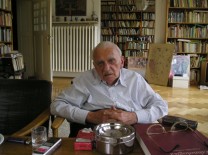Lázló Vajda (1923-2010) was born in Budapest/Hungary in 1923, where he also spent his childhood and youth. In his early years Vajda wanted to become a professional piano player, but also had a strong interest in zoology and research field trips. In 1941 he finished school and started studying Ethnography, Geography, Hungarian and Classical Philology as well as Natural History at the University in Budapest. During the Second World War, Vajda also joined the resistance movement to fight against the Nazis.
In 1947 he graduated with a dissertation about the mongolian Obo-rites and started to work as a junior assistant at the Ethnographic Department of the University in Budapest while also becoming a curator at the Hungarian Ethnographic Museum. From 1949 until 1956 he was the head chairman of a newly founded Department at the Hungarian Ethnographic Museum and at the same time gave lectures at the University.
After the Hungarian Revolt in 1956 Vajda emigrated to West Germany, where he was associated to the Frobenius-Institute in Frankfurt and was supported by the German Research Foundation (Deutsche Forschungsgemeinschaft, DFG). In 1957 Vajda took up an assistant position at the Institute for Ethnology of the Ludwig-Maximilian-University in Munich, becoming the first assistant of professor Hermann Baumann and giving lectures. He completed his habilitation thesis in 1962. Two years later he became an academic lecturer and in 1966 Vajda obtained German citizenship. In 1978 he was appointed a full professor of Ethnology. Vajda retired in 1988.
In Hungary Vajda was the first to establish a comparative method in Ethnology. His geographical focus included East Africa as well as Central and North Asia while his major theoretical interests lay not only in the comparative approach but also in the historic anthropology, as for Vajda Völkerkunde was first and foremost a historical discipline. László Vajda died in 2010.
Short Portrait: László Vajda

László Vajda
 further information
further information


